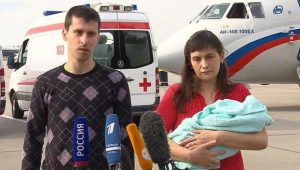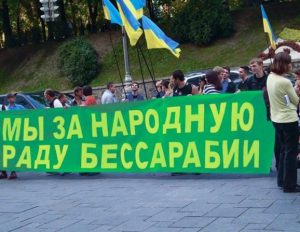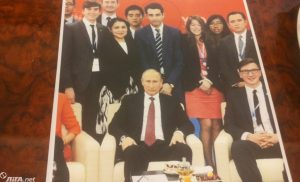Why did Russia exchange political prisoners Yuriy Soloshenko and Hennadiy Afanasyev specifically for Ukrainian journalists Olena Hlishchynska and Vitaliy Didenko?
On June 14, two political prisoners returned to Ukraine — 74-year-old Yuriy Soloshenko and 25-year-old Hennadiy Afanasyev. The exchange took place according to the “two for two” scheme. However, flying to Russia were not Russians but two Ukrainian journalists — Olena Hlinshchynska and Vitaliy Didenko.
Espreso TV Decided to find out who the two “journalists” Hlishchynska and Didenko are and why Russia had agreed to such an exchange.

Kremlin agents
Despite rumors that Soloshenko and Afanasyev would be exchanged for the defendants in the “May 2” case — Evgeniy Mefedov and Maxim Sakaulov (Russian citizens implicated in the violent events that took place in Odesa on May 2, 2014, where 48 people were killed and over 200 were injured — Ed.) — Ukrainian journalists Olena Hlishchynska and Vitaliy Didenko were the ones who flew to Russia.
Hlishchynska ( known as Olena Romanova in Facebook) was director of the Nova Khvyla (New Wave) TV company, and Didenko was editor of the pro-Russian site Nastpravda. Hlishchynska was arrested in April 2015 for violation of territorial integrity and treason. Incidentally, she gave birth in jail.
Didenko was sent to prison after a search in his apartment, where cocaine was found as well as a manifesto about the secession of Bessarabia. During the arrest, he attempted to escape, jumped out of a window and broke his legs.
Both journalists are defendants in the case of the so-called “Bessarabian people’s republic.” The scenario for the secession of Bessarabia called for Hlishchynska and Didenko to provide the communications support for this separatist movement.
According to the information of the local pro-Russian publication Taymer, Hlishchynska is accused of:
- Creating the necessary conditions for forming the false impression in society about the failure of state institutions to carry out their proper functions on the territory of the Artsyz, Bilhorod-Dnistrovskyi, Bolhrad, Sarata, Tarutyn, Tatarbunary, Reniysk, Kiliya and Izmail districts of the Odesa Oblast.
- Disseminating views about the national and cultural distinctiveness of these areas and the possibilities of passing laws on the local level.
- Encouraging general dissatisfaction with the fact that these districts are part of Ukraine and taking active steps for separating their territories.
Then the indictment refers to “planting and disseminating the following ideas through the media”:
- The idea that Bessarabian society should decide independently whether to participate in the military mobilization in Ukraine.
- The idea that a legislative body — a national parliament — should be created in Bessarabia that was not envisioned in the Constitution of Ukraine.
- The granting of special status to Bessarabia
What was the plan?

The “Bessarabian People’s Republic” was to secede through the “People’s Council of Bessarabia,” which was created in 2014 after the tragic events in Odesa. It was supposed to be announced at a congress but was disrupted by the Security Service of Ukraine (SBU), which summoned the organizers and handed them warnings.
According to information obtained by TSN.ua, a second congress took place later, which was attended by Didenko and Andriy Buzila, another journalist from Odesa. After this congress, the SBU arrested Hlishchynska, Didenko and Buzila. Buzila was released through the so-called “Savchenko law” (which stipulates that one day spent by a convict in pre-trial detention will be counted as two days — Ed.) and went to Russia.
The global plan of the separatists called for the creation of another “Odesa People’s Republic” in addition to the “Bessarabian People’s Republic.”
As reported by media, the Bessarabian “republic” was supposed to secede first because of two blown up bridges in the Odesa Oblast (on the Gulf and in the village of Mayak). Troops from Transnistria and Gagauzia (unrecognized Moldovan break-away “states” with heavy Russian military presence — Ed.) were supposed to arrive rapidly.
Meanwhile, as Ukraine was distracted by this problem, the so-called “Orthodox Cossacks” gang in Odesa was to capture the administrative buildings and declare the Odesa republic.
As the Odesa publication Dumskaya reported, political assassinations (including that of MP Oleksiy Honcharenko) were among the possible tactics to be employed by the “People’s Council of Bessarabia” to destabilize the situation. However, according to Vasyl Hrytsak, Director of the Security Service of Ukraine (SBU), all these separatist plans have been disrupted.
Maundy Thursday

In his interview with Liga.net, Vasyl Hrytsak revealed new details. The Bessarabia project was directed from Moscow by Inal Ardzinba, the deputy of Putin’s advisor Vladislav Surkov. It was with him that Hlinshchynska and Didenko were in direct contact.
According to Hrytsak, Russia agreed to the format of the exchange because “these people were needed to explain what information they had revealed to the investigators, how our side worked with them, how they were discovered, where they failed.”
“All this is needed to analyze shortcomings for the future. And, of course, it is understood that one influential group in Moscow’s government has struck a blow against another. Our intelligence indicates that there is a showdown between them now. And the people we turned over to Moscow in exchange for our patriots will help these groups fight among themselves,” Hrytsak said.
The SBU director also reported that last spring, on the Thursday before Easter, his office literally prevented the opening of a second front for the Ukrainian army. Details of the operations of the security forces were known only to President Poroshenko and the Chief of the General Staff. Even the head of the Security Service at the time, Valentyn Nalyvaichenko, was not informed.
Taking part in the operation were 150 Alpha Group special forces from different areas. On that day agency operatives secured Odesa and the Alpha agents almost simultaneously opened doors in the different parts of the city and detained suspects.
On the first day more than 30 people were detained, followed later by second and third stages of “cleaning.” When asked if Odesa was under any threats at present, Hrytsak said the city has been “cleaned out very well.”
Therefore, given the fact that Russia had agreed to the exchange of “Ukrainians for Ukrainians,” we can assume that Hlinshchynska and Didenko are really valuable employees for the Kremlin.
And the project of detaching the Bessarabia and Odesa oblasts is generally viewed by Moscow as Putin’s plan for connecting the Donetsk and Luhansk “people’s republics,” Crimea, and Transnistria with a common border.




